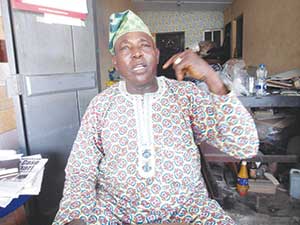Wahab Adesola started selling building materials in 1980 when he was about 25 years old.
Over 35 years into the business, he said it is one of the few trades that could make life worthwhile.
 The father of six has since coopted two of his children into the business, confident they will never regret it. He told TheNiche that the Nigerian building industry is a large sprawling sector yet to be tapped, which is why he has encouraged his children to venture into it.
The father of six has since coopted two of his children into the business, confident they will never regret it. He told TheNiche that the Nigerian building industry is a large sprawling sector yet to be tapped, which is why he has encouraged his children to venture into it.
Starting up in 1980
Adesola started by selling cosmetics on a street in Lagos Island, where he learnt the trade from his master. He left if for building materials which presented opportunity for higher profit.
Besides, in building materials business, he said, he is an importer dealing directly with manufacturers unlike cosmetics which would require him to pay more for dealership to get supply.
He imports from Spain, Italy, Brazil, and China varying qualities of building materials that come with a range of prices.
He started building materials business with less than N50,000 in 1980 after serving his master and rose from selling by bits and pieces by keeping to stringent savings.
Through this habit of selling, saving almost every profit and then ploughing back the profit, he saved enough for a startup capital to rent a shop beside Olorunsogo Bus Stop, Agege Motor Road, Mushin, Lagos. He remains there to date.
“If a customer came, I went and sourced the material he needed. I saved the profit of each sale and added it to my initial capital to buy more. That was how I continued until I saved enough to pay the rent for a shop.”
But today, anybody wishing to start the business would need several millions of naira due to the sharp rise in foreign exchange rate from less than N5 to the dollar in 1980 to over N200 to the dollar now.
However, a startup entrepreneur may start as a market boy running after customers to earn a living.
Trust as bond
Adesola disclosed that what helped him most was that in the 1980s manufacturers abroad had unbroken trust in Nigerian businessmen.
“At that time, if I ordered for one container load of building materials, the company would give me additional container load on credit. The trust was there as at that time. But it is no longer like that today because there is no more trust that let alone such credit facility.”
After sales, he remitted the money for additional consignment he got on credit. He said it was as if the dealers had agreed among themselves never to default, and no dealership defaulted. Such trust is rare these days.
Adesola recollected that there were very few dealers in the hey day of the business. He was one of the few pioneers of the business around the Mushin axis.
According to him, since there were few of them in the business, they could record impressive turnover but with low profit margin on each item. He said they could use N50 or N100 profit margin to sell one square foot of tiles then, depending on the quantity.
With exchange rate hitting roof today, Adesola noted that the profit margin has risen sharply just like the naira to dollar exchange rate has widened in gap.
“By that time, you can’t take cash to Europe, America or elsewhere. You have to remit the money through bank, and two or three months later, you pick up your consignment.”
He explained that they could obtain Banker’s Acceptance (BA) of a letter of credit to import the wares even if the dealer could not afford cash transactions at that moment.
With the letter of credit, the manufacturers would release any order because they could hold the banker responsible in case of default.
The banker expected that in 90 days after the letter of credit had been issued, the importer would back it with cash. If the importer had no money, the bank could offer him cash on request.
In other words, the bank that offered the importer letter of credit could also give him cash to clear the goods if he had no money. But that depended on the level of relationship between him and his banker.
The bank would send their staff to confirm the clearing of the goods. Thereafter, the banker would give about 90 days to pay back after selling the goods.
Why such facility is rare today
Adesola explained that the good old days of customer and banker relationship have almost died. What is left is a mere shadow.
The problem arose when some dealers started smuggling cash abroad to do business directly instead of routing cash transfers through banks. This led to a decline in cordial relationship and trust between importers and bankers.
Adesola counselled that startup entrepreneurs would require at least three months’ training, depending on their level of intelligence.
He urged them not to start with much money because it may be wasted before they master the ropes. The best thing is to start small and grow over time, he stressed.
Adesola, 60, quit cosmetics trade to find gold in building materials












